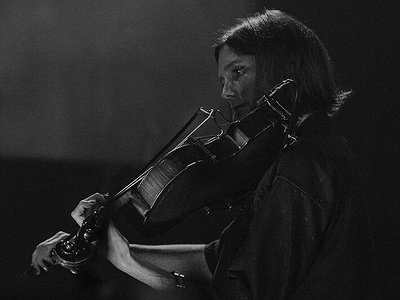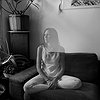Could you describe your creative process on the basis of a piece or album that's particularly dear to you, please? Where did the ideas come from, how were they transformed in your mind, what did you start with and how do you refine these beginnings into the finished work of art?
This latest record Sacracorpa came from a flash of life and death. December 17, 2015 was a turning point, the beginning of life on borrowed time. A medical condition from birth came back as an emergency on that date, inverting my perspective from a lifetime low to a wave of overwhelming gratitude to be alive. I began recording in early 2016, and the album unfolded rather quickly.
There are many descriptions of the ideal state of mind for being creative. What is it like for you? What supports this ideal state of mind and what are distractions? Are there strategies to enter into this state more easily?
The ideal creative state is timeless, which is tricky to find intentionally. If I try to disregard time, I become more attuned to it. Only after time has slipped away do I become conscious of it again. Free writing helps me get into a state of flow. I start writing about mundane concerns and allow myself to open onto dreamier, more abstract, or psychedelic writing. The key is to keep writing after I feel I have nothing left to say.
How is playing live and writing music in the studio connected? What do you achieve and draw from each experience personally? How do you see the relationship between improvisation and composition in this regard?
Performing takes energy from me, and recording puts it back in. Improvisation is my white whale. I’ve been doing it for decades with unpredictable satisfaction. When it’s good, it’s the best music I can imagine. When it’s not good, I walk away in paralyzing self-criticism. Harpooning the white whale will likely mean making peace with my inability to control the results.
How do you see the relationship between the 'sound' aspects of music and the 'composition' aspects? How do you work with sound and timbre to meet certain production ideas and in which way can certain sounds already take on compositional qualities?
In my other life, I write about sound art, and I’m fascinated by that discipline’s emphasis on site specificity. Composing sound for space requires an understanding of the ways it moves and reflects at different frequencies and amplitudes, but, alas, I’m far from understanding those details. For now, I compose sound and music differently. Music theory takes me down one road, and sound studies takes me down another. I would love to bring them into the same house.
Our sense of hearing shares intriguing connections to other senses. From your experience, what are some of the most inspiring overlaps between different senses - and what do they tell us about the way our senses work? What happens to sound at its outermost borders?
In my dreams, I will build a sonic sensorium, where listeners can dampen other sensory stimuli and absorb themselves into whatever hearing capabilities their bodies afford. Soft fabrics, gentle aromatics, and low lighting will make the sensorium a space to listen undisturbed.
Art can be a purpose in its own right, but it can also directly feed back into everyday life, take on a social and political role and lead to more engagement. Can you describe your approach to art and being an artist?
Jacques Rancière, in addition to describing an aesthetic sensorium, points to the absence of mediating text as a way to emancipate the spectator or listener. Without a conceptual statement, I want to make space for people to listen in whatever way they are able and to talk about what they have heard. Unseating the authorial power of the artist is crucial to opening new discourse and allowing aesthetic communities to jump out of the deep grooves carved by art and music history and theory.
It is remarkable, in a way, that we have arrived in the 21st century with the basic concept of music still intact. Do you have a vision of music, an idea of what music could be beyond its current form?
I wonder if art and music will sublate into a yet-unknown world of sound. Experimental music and sound art remain tied to their disciplines, media, and narrow expectations of bodies’ sensory abilities. The dichotomies of exhibition and performance, composition and improvisation, and museum and concert hall might each be dissolved in the future world of sound.



